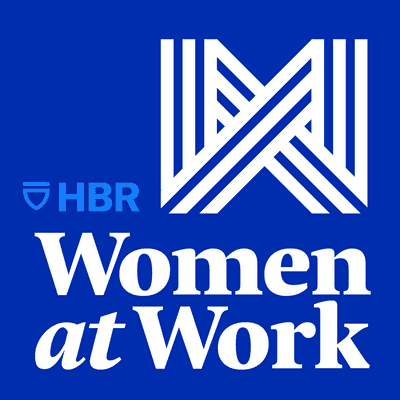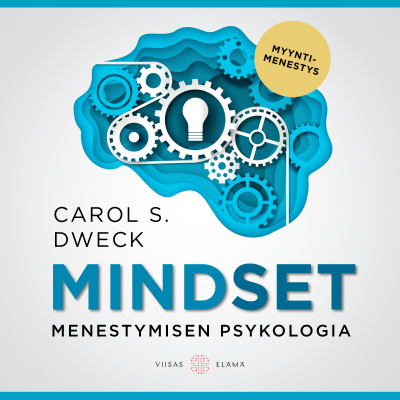
Women at Work
englanti
Talous & ura
Rajoitettu tarjous
1 kuukausi hintaan 1 €
Sitten 7,99 € / kuukausiPeru milloin tahansa.
- Podimon podcastit
- Lataa offline-käyttöön
Lisää Women at Work
Women face gender discrimination throughout our careers. It doesn't have to derail our ambitions — but how do we prepare to deal with it? There's no workplace orientation session about narrowing the wage gap, standing up to interrupting male colleagues, or taking on many other issues we encounter at work. So HBR staffers Amy Bernstein, Amy Gallo, and Emily Caulfield are untangling some of the knottiest problems. They interview experts on gender, tell stories about their own experiences, and give lots of practical advice to help you succeed in spite of the obstacles.
Kaikki jaksot
161 jaksotThat’s Our Show
This is the last episode of the most meaningful project we’ve ever been part of. The Amys couldn’t imagine signing off without telling you why the podcast is ending, reminiscing with founding producer Amanda Kersey, and fitting in two final Ask the Amys questions. HBR’s Maureen Hoch is here too, to tell the origin story of the show—because it was her idea, and a good one, right? Saying goodbye to all the women who’ve listened since 2018 is gut-wrenching. If the podcast made a difference in your life, please bring us to tears/make us smile with an email: womenatwork@hbr.org [womenatwork@hbr.org]. If and when you do that, you’ll receive an auto reply that includes a list of episodes organized by topic. Hopefully that will direct you to perspectives and advice that’ll help you make sense of your experiences, aim high, go after what you need, get through tough times, and take care of yourself. That’s the sort of insight and support we’ve spent the past eight years aiming to give this audience, and you all have in turn given so much back—to the Women at Work team and to one another.
Ask the Amys: Sabotaging Bosses, Irritating Employees, and More
What do you do when your request for professional development seems to annoy your manager? Or when you’re aiming for a bigger role but keep hearing that you’re “too in the weeds”? Or when a team member’s behavior undermines others but you’re not sure whether to call it out because it feels like part of their personality? The Amys offer advice for advocating for yourself without setting off alarm bells, shifting from tactical execution to strategic thinking, and confronting behavior that’s corrosive but hard to pin down. Other listener questions they respond to: * How can I push for a more robust and effective feedback and review system at my company? * How do I decide which workplace battles are worth fighting? * How do I remain professional and confident when my soon-to-depart manager is belittling me? * How can I raise gender equity issues in a department that favors male colleagues? Resources: * “How Managers Can Make Feedback a Team Habit [https://hbr.org/2023/04/how-managers-can-make-feedback-a-team-habit?ab=ai-beta],” by Helen Tupper and Sarah Ellis * “Get the Boss to Buy In [https://hbr.org/2015/01/get-the-boss-to-buy-in],” by Susan (Sue) Ashford and James R. Detert * HBR Guide to Building Your Business Case [https://store.hbr.org/product/hbr-guide-to-building-your-business-case/15038], by Ray Sheen and Amy Gallo * “How to Push for Policy Changes at Your Company [https://hbr.org/podcast/2022/11/how-to-push-for-policy-changes-at-your-company],” from Women at Work * “How to Pick Your Battles at Work [https://hbr.org/2013/10/how-to-pick-your-battles-at-work],” by Amy Gallo * “Manage Your Energy, Not Your Time [https://hbr.org/2007/10/manage-your-energy-not-your-time],” by Tony Schwartz and Catherine McCarthy * Speak Up, Speak Out (HBR Women at Work Series) [https://www.amazon.com/Speak-Out-HBR-Women-Work/dp/164782222X] * “How to Advance in Your Career When Your Boss Won’t Help [https://hbr.org/2018/07/how-to-advance-in-your-career-when-your-boss-wont-help?ab=ai-beta],” by Kristi Hedges * “You Can’t Move Up If You’re Stuck in Your Boss’s Shadow [https://hbr.org/2015/05/you-cant-move-up-if-youre-stuck-in-your-bosss-shadow?ab=ai-beta]” by Rebecca Knight * Thriving in a Male-Dominated Workplace (HBR Women at Work Series) [https://www.amazon.com/Thriving-Male-Dominated-Workplace-Women-Work/dp/1647824613] * “4 Ways to Improve Your Strategic Thinking Skills [https://hbr.org/2016/12/4-ways-to-improve-your-strategic-thinking-skills],” by Nina Bowman * How to Demonstrate Your Strategic Thinking Skills [https://hbr.org/2019/09/how-to-demonstrate-your-strategic-thinking-skills],” by Nina Bowman Sign up for the Women at Work newsletter [https://hbr.org/email-newsletters?movetile=womenatwork]. Email us: womenatwork@hbr.org [womenatwork@hbr.org]
Let Go of the Beliefs That Limit How You Lead
Many of us have internal beliefs—I need it done now, I know I’m right, I need to be involved—that feel like truth but actually hold us back as leaders. Executive coach Muriel Wilkins calls these counterproductive beliefs “hidden blockers,” and she talks the Amys through the process of identifying theirs and then reframing them. They also explore how blockers show up at the team and organizational level, like when lack of trust leads to a bloated meeting culture. Muriel shares how leaders can encourage mindset shifts in their organizations, beginning with themselves, and how to create conditions that allow others to examine what’s driving their behavior without judgment or overreach. Guest expert: Muriel Wilkins is an executive coach who hosts the HBR podcast Coaching Real Leaders [https://hbr.org/2020/12/podcast-coaching-real-leaders] and whose latest book is Leadership Unblocked: Break Through the Beliefs That Limit Your Potential [https://www.amazon.com/Leadership-Unblocked-Through-Beliefs-Potential/dp/1647827264]. Resources: * “What Self-Awareness Really Is (and How to Cultivate It) [https://hbr.org/2018/01/what-self-awareness-really-is-and-how-to-cultivate-it],” by Tasha Eurich * “Becoming More Collaborative — When You Like to Be in Control [https://hbr.org/2023/03/becoming-more-collaborative-when-you-like-to-be-in-control],” by Jenny Fernandez and Luis Velasquez * “Are You a Micromanager or Too Hands-Off [https://hbr.org/2024/08/are-you-a-micromanager-or-too-hands-off]?” by Carole-Ann Penney * “How to Manage Someone Who Thinks Everything Is Urgent [https://hbr.org/2017/08/how-to-manage-someone-who-thinks-everything-is-urgent],” by Liz Kislik * “The Insidious Effects of Hurrying [https://hbr.org/2025/01/the-insidious-effects-of-hurrying],” by Kandi Wiens Sign up for the Women at Work newsletter [https://hbr.org/email-newsletters?movetile=womenatwork]. Email us: womenatwork@hbr.org [womenatwork@hbr.org]
Managing Up, One Conversation at a Time
Have you ever realized, partway through a project, that you and your boss aren’t on the same page? Maybe your definitions of success differed, or their expectations were unclear. Maybe you couldn’t get them to listen, or you couldn’t figure out why they insisted on doing things a certain way. Managing up means tackling these disconnects head-on—and doing it through honest, well-timed discussions. Executive coach Melody Wilding joins Amy G to explain why alignment on goals and clarity around working styles are essential. They talk through how to start these conversations without awkwardness, what to say to make them productive, and how to adapt your approach without losing your authenticity. Plus, they answer listener questions and hear from Amy B about how she handles alignment with both her boss and her team. Guest expert: Melody Wilding is an executive coach, human behavior professor, and author of Managing Up: How to Get What You Need from the People in Charge [https://www.amazon.com/Managing-Up-What-People-Charge/dp/0593444655/ref=sr_1_1?crid=EASSULCK9PU8&dib=eyJ2IjoiMSJ9.-7VWrt-vuH3beRCDdyBYt03OvqKGOpV3cwenNPSZlnfGjHj071QN20LucGBJIEps.AyMpGXuAp20qYERxtrizUQTebKV5kBJPHsB8Y0uLUdk&dib_tag=se&keywords=Managing+Up%3A+How+to+Get+What+You+Need+from+the+People+in+Charge&qid=1744993210&sprefix=managing+up+how+to+get+what+you+need+from+the+people+in+charge%2Caps%2C101&sr=8-1]. Resources: * “The Essentials: Managing Up [https://podcasts.apple.com/us/podcast/the-essentials-managing-up/id1336174427?i=1000557942854],” from Women at Work * “7 Questions to Decode Your Managers Priorities [https://hbr.org/2025/02/7-questions-to-decode-your-managers-priorities],” by Melody Wilding * “Before You Start Collaborating with Someone, Talk About Your Work Styles [https://hbr.org/2024/05/before-you-start-collaborating-with-someone-talk-about-your-work-styles],” by Anke Thiele * “28 Questions to Ask Your Boss in Your One-on-Ones [https://hbr.org/2023/06/28-questions-to-ask-your-boss-in-your-one-on-ones],” by Steven G. Rogelberg et al. * “Managing Up When Leadership Is Stuck in the Weeds [https://hbr.org/2022/08/managing-up-when-leadership-is-stuck-in-the-weeds],” Ian Gross and Samir Ranavat * “When Your Manager is Ineffective—and You Feel Stuck [https://hbr.org/2024/11/when-your-manager-is-ineffective-and-you-feel-stuck],” by Sarah Mann and Luis Velasquez Sign up for the Women at Work newsletter [https://hbr.org/email-newsletters?movetile=womenatwork].
What We Can Learn from Taylor Swift
When our colleague Kevin Evers wrote There’s Nothing Like This: The Strategic Genius of Taylor Swift [https://www.amazon.com/Theres-Nothing-Like-This-Strategic/dp/B0DD2XL7C5], we knew we had to talk about it. For so many women, she’s a role model—personally and professionally. Four HBR Swifties highlight how her instincts and decisions offer lessons in leadership, strategy, and staying power. Resources: * “The Strategic Genius of Taylor Swift [https://hbr.org/2025/03/the-strategic-genius-of-taylor-swift],” by Kevin Evers * “What All Leaders Can Learn from Taylor Swift [https://hbr.org/podcast/2025/04/what-all-leaders-can-learn-from-taylor-swift],” from IdeaCast Sign up for the Women at Work newsletter [https://hbr.org/email-newsletters?movetile=womenatwork]. Email us: womenatwork@hbr.org [womenatwork@hbr.org]
Valitse tilauksesi
Rajoitettu tarjous
Premium
Podimon podcastit
Lataa offline-käyttöön
Peru milloin tahansa
1 kuukausi hintaan 1 €
Sitten 7,99 € / kuukausi
Premium
20 tuntia äänikirjoja
Podimon podcastit
Lataa offline-käyttöön
Peru milloin tahansa
30 vrk ilmainen kokeilu
Sitten 9,99 € / month
Premium
100 tuntia äänikirjoja
Podimon podcastit
Lataa offline-käyttöön
Peru milloin tahansa
30 vrk ilmainen kokeilu
Sitten 19,99 € / month
1 kuukausi hintaan 1 €. Sitten 7,99 € / kuukausi. Peru milloin tahansa.

































